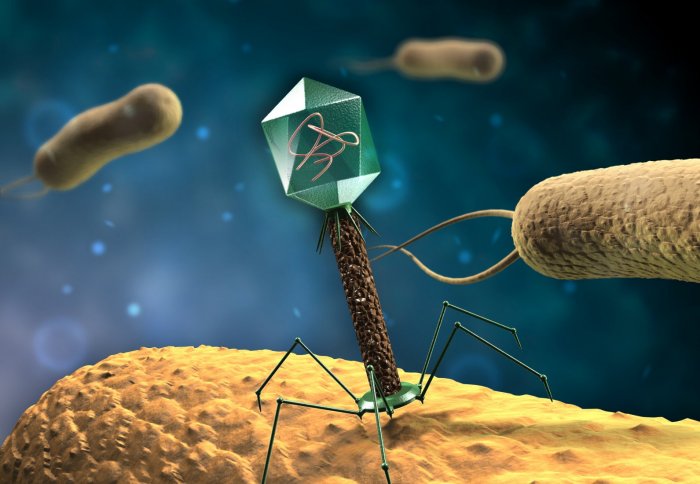Viruses teach scientists new ways to cripple bacteria
by Sam Wong

Imperial scientists have discovered a tool used by viruses to stop bacteria from making proteins.
The researchers hope to develop new ways to fight bacterial infections by learning from phages – viruses that infect bacteria.
The new study shows how a protein produced by phages disables an important bacterial enzyme, RNA polymerase.
The study was led by Professor Sivaramesh Wigneshweraraj and Professor Steve Matthews, both Wellcome Trust Investigators at the MRC Centre for Molecular Bacteriology and Infection at Imperial.
“Phages have evolved an impressive array of mechanisms to sabotage important cell processes in bacteria,” said Professor Wigneshweraraj. “Studying these mechanisms helps us to identify ways to develop new antibiotics.”
RNA polymerase is essential for reading the genetic code, making it an important target for phages. Without it, bacteria cannot make proteins. It is also targeted by the rifamycin group of antibiotics, but resistance to these drugs is a common problem.
The study reveals a new way to inhibit the RNA polymerase which hasn’t been seen before. To determine which genes should be read, an extra component called a sigma factor has to attach to the RNA polymerase. A protein produced by the phage Xp10 disables RNA polymerase by knocking off the sigma factor.
“Bacteria rely on the sigma factor to direct RNA polymerase to the right genes,” said Professor Matthews. “Without the sigma factor, the enzyme is effectively blind. These findings can serve as a template for drug discovery.”
The study was funded by the Wellcome Trust and Biotechnology and Biological Sciences Research Council and published in Nucleic Acids Research.
Reference: B. Liu ‘A bacteriophage transcription regulator inhibits bacterial transcription initiation by sigma-factor Displacement.’ Nucleic Acids Research, 2014, 1–12 doi:10.1093/nar/gku080
Article supporters
Article text (excluding photos or graphics) © Imperial College London.
Photos and graphics subject to third party copyright used with permission or © Imperial College London.
Reporter
Sam Wong
School of Professional Development